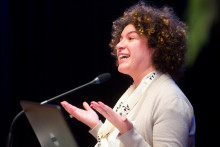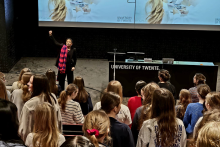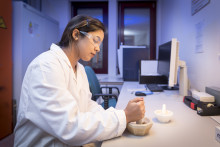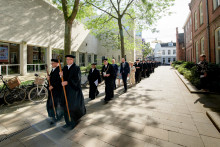report on Harassment in Dutch academia
The LNVH report is based on interviews and written testimonials of 53 female academics from 13 different Dutch institutions, all of whom anonymously shared their experiences with harassment. According to the study’s authors, the research ‘reveals an inconvenient truth: harassment in academia happens, it is related to cultural and structural factors, and it can have detrimental consequences.’
The study demonstrates various manifestations of harassment – which range from scientific sabotage (for example denying authorship) to sexual harassment, physical and verbal threats, denigration, exclusion and not facilitating ‘special needs’. The report also shows how deeply harassment impacts victims’ lives. Research participants reported feeling unsafe at their workplace, as well as suffering physical and psychological consequences ranging from chronic pain to burnout and depression. Several research participants reported having to use medication in order to be able to cope with (the consequences of) the harassment.
What was your initial reaction to the report?
Magnanimo: ‘I recognize the behavior described in the research. I know of cases here at the university that would fit the harassment description very well. This just confirms that the numbers are real, that this happens everywhere. I also recognize the main causes of the behavior: strong hierarchy and competitiveness of the academic world facilitate harassment. What surprised me was the proportion. Most of the women experiencing harassment were either assistant professors or even full professors. I would expect this behavior to affect mostly younger scientists who are more dependent on their supervisors.’
Would you say that the findings – that harassment affects a large portion of women in academia - also apply to the University of Twente?
‘Definitely, it also applies to the environment here. The overall number of Dutch universities (13), where the cases in the report took place, also suggests it. One issue might be related to the tenure track model in the Netherlands. In other countries, if you are a tenure tracker you are considered an independent researcher. Here you are part of a chair. That means that you are asked to outperform everyone, to be a ‘superscientist’, but you are in a chair and therefore dependent on a supervisor. As soon as you are dependent on someone, this facilitates harassment, especially ‘scientific sabotage’, as defined in the report. There was a report by the American National Academy of Science about harassment in STEM and, interestingly enough, one of the recommendations of that report was to provide young scientists with (funding) independence. I strongly agree with that.’
Do you agree with the recommendations presented in the LNVH report?
‘Yes. Firstly they suggest to create awareness and knowledge about the issue of harassment in academia within all levels of the organisation. We should make it crystal clear how people should behave and support each other. To do that, you have to educate people. We should make it structural, perhaps have official qualifications or national evaluations about the work climate. Further, the report suggests to create support structures and culture of care. The support structure is crucial. The lack of knowledge (for example, if you don’t know where to go to ask support), prevents action. We should have someone truly independent of the university.’
How will the FFNT act on the results of the research?
‘I think we have a role in the awareness part. We try to get a dialogue going, have the issue in the spotlight. At the very least, we will share the findings with our members, so perhaps people who recognize themselves in it can feel a bit less alone. We will also bring the findings into our discussions with the UT executive board. The FFNT is a platform, but it shouldn’t be only us making this a priority. The university itself should promote and support the discussion.’
Professor Marieke Huisman, chair of the ambassador's network
The ambassador's network advises the executive board of the University of Twente on diversity policies. How do they plan to use the report’s findings?
Chair of the ambassador's network professor Marieke Huisman: ‘We plan to put the outcome of this report on the agenda for our meetings with the deans and head of services, as well as when we talk with the board, to discuss their views and how they address the points raised in the report. As Ambassador’s network, we strongly support the idea of creating some form of an ‘integrity office’, to have central policies about this at the UT. This report shows once more that this is necessary.’
Is there anything specific that you believe the UT could definitely improve?
‘Giving more degree of independence at all career levels. Everyone should be able to take the next step in their career without depending on their supervisor. Furthermore, in academia in general there is focus on the ‘superscientist’, on personal achievements. Instead we should try to praise collaboration and break the cycle of a ‘rat race’ that is also described in the report. On a more practical note, trainings for supervisors and any committees would go a long way. If there is a decisive power, there should be education.’
What about the structural support offered here?
‘Information and clarity are necessary. In the last year, after the discussion about #MeToo in academia started, there is been a bit effort at UT to make information about integrity and procedures against misconduct accessible to everybody. However, there is still work to do, as people often don’t know what they can do and where to find information. We could offer a more coordinated approach, perhaps even inform people at the introduction meeting. There are three aspects of support: the information needs to be readily available, the support offered needs to be sufficient and the support offered needs to be powerful enough. Many women in the report mentioned that they sought help, but the people they approached – HR officers or supervisors – couldn’t really take any action. We need an independent entity that has the power to help you.’
Do you believe this report will cause the issue of harassment in academia to be taken more seriously?
‘I think many people might be surprised by its outcome. It shows that harassment and intimidation happen everywhere. I think this report can have a big impact. It is important that, along with an immediate reaction, the report drives reflection and, in turn, a coordinated long-term strategy. The UT must a safe place for all employees.’
What can you do if you are experiencing harassment?
- The UT employs several confidential advisors, who you can contact for advice and support whenever you have to deal with unacceptable behavior.
- Staff members can lodge a formal complaint with the Executive Board. Such complaints need to be submitted in writing and they must concern a particular action, such as discrimination, aggression or sexual harassment.
- Students can report to a student counsellor. If students wish to file a formal complaint, they can do so at the University of Twente Complaints Desk located at Student Services on the second floor of building Vrijhof.
- The above and other information can also be found in the University of Twente’s Code of conduct for acceptable and unacceptable behavior.







